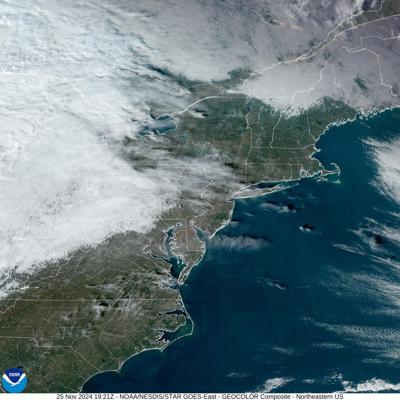A low-pressure system is expected to impact northern New England late on Thursday and into Friday, bringing some snow and ice later on Thanksgiving Day.
Most of New Hampshire and western Maine are also currently experiencing severe drought conditions that could have impacts on agriculture next year.
The track and ultimate impacts of the coming system are difficult to predict, but a paltry dusting of snow fell briefly on the City of Laconia around 3 p.m. Sunday afternoon. A period of wintry precipitation is expected Tuesday morning and could cause slick conditions on the road, according to forecasters at the Gray, Maine, office of the National Weather Service. More severe weather is expected later in the week, particularly on Thanksgiving evening.
“This is the first potential snow of the year for most people,” Donald Dumont, warning coordination meteorologist at the National Weather Service in Gray, said Monday morning.
Temperatures were expected to drop to between the high 20s and low 30s late on Monday night and the National Weather Service placed a winter weather advisory in effect in anticipation of the coming cold. The winter weather event was expected to begin around 1 a.m. on Tuesday morning and last until the early afternoon and was predicted to be moderately severe, posing potential threats to life or property.
The cold and precipitation could bring up to 0.1 inches of sleet, and another 0.1 inches of ice and about 1 inch of snow was expected in the northernmost parts of the region. While the amount of ice accumulation was expected to be light, forecasters note freezing rain brings the more precarious risks along with it, describing travel conditions as potentially “extremely dangerous.”
Dumont said the first slate of weather Tuesday isn’t expected to be severe.
“This first little wave [Tuesday] doesn’t look like it’s going to be too big a deal,” he said, adding it will likely bring mostly rainfall. More severe weather is expected Thursday afternoon and evening, after many people have finished their Thanksgiving travel. “There will be precipitation starting later in the day on Thursday.”
The rain and snow mix is expected to peter out by Friday morning.
“It’s still highly uncertain at this point,” Dumont said. “The Lakes Region will probably get some snow.”
But Dumont said the storm, if it occurs, is not expected to bring severe winds. There could be minor power outages and heavy, wet snowfall.
“It doesn’t look like there’s going to be any big wind with it,” he said.
The year’s first snowfall is slightly late, but still within the normal range, he said. One of the earliest snow events on record in northern New England occurred on Oct. 10, 1979. Laconia also saw an early snowstorm in 2021, which occurred Oct. 17. Last year, significant snowstorms occurred in late March and in early April.
“If you’re traveling Thursday, especially if you’re going up north, pay attention to the weather forecasts.”
While the first predicted snow isn’t expected to be severe, meteorologists are tracking another potential problem — severe drought throughout New Hampshire and western Maine.
Belknap County has experienced a severe drought through the fall. Across the Granite State and western Maine, fall rainfall was 6 to 10 inches less than is usually observed, about 30%-50% less than in a typical year.
“We haven’t had any [precipitation], you can’t get snow if it doesn't fall out of the sky,” Dumont said. “This is kind of a unique drought.”
Pointing to the fact the region experienced a generally wet year, Dumont said current drought conditions haven’t had a serious impact on markers they pay attention to like the levels of reservoirs, rivers and wells. But a year from now, the situation could be bad, because the drought is interrupting the “recharge period” for soil to absorb retain water and moisture.
Groundwater cycles each year are as follows: in the summer, soil moisture drops because of the heat and natural lack of precipitation. In fall, there is a “recharge,” when plants go dormant and don’t “suck up” the water from the ground, and more precipitation is expected. Around December, the ground freezes and is unable to soak up water and moisture. But in the spring, there is another “recharge” when the ground thaws and ice and snow melts.
“We just lost our fall recharge,” Dumont said. “We’re already behind on the power curve.”
If this year’s winter is severe and cold, causing the ground to freeze for a long period of time, it could exacerbate drought conditions next year, which Dumont noted has an outsized impact on agricultural activity and therefore the economy.
“We can come out of it if we have a really warm winter,” he said, adding a warm winter plus large snow packs at higher elevations will alleviate the drought in the spring.
But overall, the drought came late enough not to disproportionately impact farming, he said. A drought statement by meteorologists in Gray observed drier than normal conditions beginning in September, making it one of the driest falls on record. Above-average temperatures coupled with lower-than-average rainfall exacerbated the “short-term” drought.
Because the region saw a lot of precipitation throughout the year before the drought, water levels are not concerning.
“Our lake levels are fine,” he said.
To read the report on this year's drought, visit weather.gov/media/gyx/DGT/DGT_GYX_11222024.pdf.


















(0) comments
Welcome to the discussion.
Log In
Keep it Clean. Please avoid obscene, vulgar, lewd, racist or sexually-oriented language.
PLEASE TURN OFF YOUR CAPS LOCK.
Don't Threaten. Threats of harming another person will not be tolerated.
Be Truthful. Don't knowingly lie about anyone or anything.
Be Nice. No racism, sexism or any sort of -ism that is degrading to another person.
Be Proactive. Use the 'Report' link on each comment to let us know of abusive posts.
Share with Us. We'd love to hear eyewitness accounts, the history behind an article.